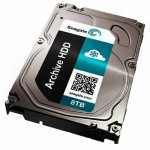Follow up on Seagate Archive 8TB HDD Benchmark
 Two weeks back we benchmarked the Seagate Archive 8Tb drive, and it has gained some feedback. We’d like to take this opportunity to clear some things.
Two weeks back we benchmarked the Seagate Archive 8Tb drive, and it has gained some feedback. We’d like to take this opportunity to clear some things.
There was some constructive criticism about this drive and some questions presented to us about their viability in 24/7 production, afterall they are meant for archiving not 24/7 utilization.
Seagate Archive 180TB/Year Write Limit – and Why this doesn’t matter
Everyone concerned about this should compare the datasheet of Archive 8Tb HDD to the Desktop 3Tb Model which is one of the most common disks found in low cost servers today. Workload rate limit section is what’s everyone is fussing about.
The desktop model is rated only for 8×5 workload with 55TB/Year, while the Archive HDD is rated for 24×7 180TB/Year – A more than 3 fold increase.
180TB/Year doesn’t even matter for Seedboxes
The 55TB/Year limit of the Desktop models hasn’t ever stopped the warranty replacement for example. So why would this 180TB/Year limit do that?
Would an seedbox even reach that? Depends. 180TB/Year is 22.5 times the disk capacity (not accounting for 1,000 vs. 1,024 calculation). That means all content in the disk needs to change roughly monthly. That, simply does not happen with disk sizes this great. On our production server with these disks they average about 1.6MB/s average write, while 180TB/Year is roughly 6MB/s. Other production servers had 277KB/s, 1304KB/s, 2481KB/s, 1242KB/s, 1197KB/s (Free Seedbox server!), 715KB/s (285day average), 1469KB/s (284day average). This collection of servers was new and old, with 2×2 or 2x3TB disks mostly.
In other words, it’s highly unlikely the 180TB/year limit is to be reached.
Seagate Archive Drive is meant for 24×7 utilization and for clouds
The Archive drive is actually meant for 24×7 utilization, unlike the most common 3Tb Desktop model in low cost servers. Archive drive also are balanced for high density (Cloud, servers) environments, unlike the desktop variant.
These drives are meant for all kinds of cloud activity, object storage etc. usually for “cold data”, but the reasons are different than what you would think. Most clouds use extensive caching and storage tiering these days, 8Tb with the slow seek of a spinning disk? Not very fast, hence it’s best suitable in large cloud environments on the cold data tier.
Cold data tier in a cluster is infrequently accessed, often dedupped, compressed, multi-replica or erasure encoded, online but very slow. A single 8Tb disk in a environment like this could be serving 100 virtual servers. Impossible, to do without heavy caching with the drawbacks of a spinning disk of this size. Maybe, just maybe, if they used 250GB disks they wouldn’t need caching as much.
Hence, we can sum it up as Cold Data == Slow storage == Spinning rust! (In Enterprise environments)
No – The drives do not slow down
Some redditor was asking if the drives get slower as more data has been written, like some has reported. Something to do with going out of “unshingled buffer space”. This hasn’t happened at least in our use – the disks write just as fast as they wrote when they were completely empty.
Already in production and being utilized we tried couple huge writes, up to around 137GiB in size we still reached 259MB/s write speed. Which was expected as there was other activity in the server as well.
Summary
We are still very satisfied with these drives, and they are performing very well. We continue to see higher performance out of these 5900RPM drives than the usual Seagate/WD/Toshiba/Hitachi 3TB 7200RPM drives – in terms of iops. Which is very surprising and unexpected.
We plan to get more of these drives as the need presents itself, however, the data sizes we offer already are great. Most likely we will be ordering these for customer servers directly, for those who needs the very high capacity servers. We are currently asking 300€ per disk to upgrade from 3TB to 8TB or 30€ each month. That works out as 4x8TB 6core Opteron & 24GB ECC Ram with 100Mbps going for 215€ per month, or with 1Gbps Burstable 250€ per month and on servers over 200€/Month we even offer 16 Free additional IPs upon request.
